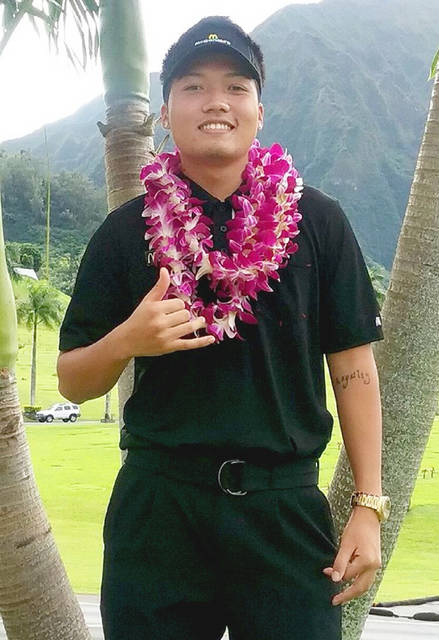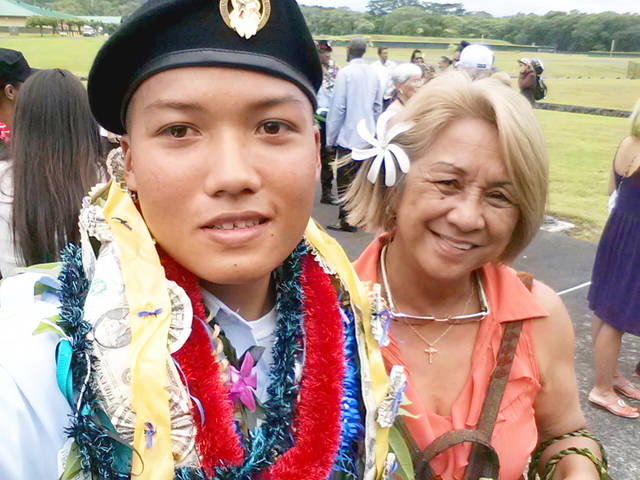For one Kekaha family, the reality of the nation’s drug crisis hit too close to home last year when they received a phone call — the kind no one hopes to receive.
There had been an accident.
Shirley Simbre-Medeiros said she and her husband Wayne rushed from their home to Wilcox Medical Center in Lihue. When they arrived, there was a group of kids crying in the parking lot.
“I got out of the car and proceeded to the entrance of the emergency room. I saw my granddaughter crying,” Simbre-Medeiros said. “I walked in. The security guards met me and they showed me to a room. The doctor was there. My daughter and her husband were there.”
It was then, she said, the doctor told her that Shiloh, the grandson whom she and her husband had adopted and raised, had died. It was March 11, 2017.
“It was a shock,” Simbre-Medeiros said. “He’d been found in 3 feet of calm water at Allerton Beach in Poipu and couldn’t be revived.”
When the doctor told Simbre-Medeiros of her grandson’s death, she immediately wanted to see him, even though he hadn’t been cleaned up yet.
“He still had sand in his ears and on other parts of his body,” she said.
When the toxicology report came back, it revealed Shiloh, 18, had overdosed on four drugs: methamphetamine, two different over-the-counter pills and ethanol.
This wasn’t his first experience with drugs.
For Shiloh, life wasn’t easy, Simbre-Medeiros said. He was one of five grandchildren she and her husband adopted and raised. They were all around the same age.
“I had four car seats and three booster (seats),” she said. “You just make things work.”
In all, Simbre-Medeiros and her husband raised 14 grandchildren.
She had a 15-passenger van that she used to transport the kids to baseball and football practice. “I was known as the auntie with all of the kids,” she said.
As a child, Shiloh was quiet and shy, she said. He didn’t have any issues during elementary school, but that changed when he entered middle school, and began hanging out with the wrong crowd.
“He made wrong choices,” she said. “He got caught stealing, don’t come home, I had to go look for him.”
Things took a turn for the worse during his sophomore year of high school, she said, when he stopped going to school and didn’t come home. He was keeping company with adults.
“I was told he was sleeping in a hotel room with older guys,” she said. “I was told that they were giving him drugs.”
The family enlisted the help of the Kauai Police Department’s truancy office and eventually sent Shiloh to Youth ChalleNGe, where he earned his high school diploma in 2016.
But when he came home, he continued to struggle with drug abuse.
“It was very hard meeting up with the wrong crowd and having a girlfriend. Shiloh didn’t know how to handle stress so he used drugs,” Simbre-Medeiros said.
At times, she said, he was suicidal.
Because of his continued drug abuse issues, Simbre-Medeiros said Shiloh attended a drug treatment program on Oahu. During his time in the program, he got a job at McDonald’s, where he was recognized as employee of the month.
He completed the drug treatment program with honors and returned to Kauai in January 2016, reapplying for his job at McDonald’s in Eleele and pursuing a military career.
“The Wednesday before he died, he went to the National Guard office in Hanapepe,” Simbre-Medeiros said. “He was going to go in.”
The loss, she said, has been great. “He was so young. He didn’t really get to start his life,” she said.
This past year has been excruciating for the family.
“His siblings and mother were so hurt (by his death) that they couldn’t function,” Simbre-Medeiros said. “We all couldn’t.”
For the Simbre-Medeiros family, there are many unanswered questions surrounding Shiloh’s death.
“There was a bunch of you together those two days, so I need to know what was what,” Simbre-Medeiros said. “I just hope that you all have a conscience, knowing the truth, but not saying anything.”
The last time Simbre-Medeiros saw her grandson alive was March 10.
“I was going home from work, that afternoon, saw Shiloh walking to the bus stop on Akialoa Street. I followed him and asked him where he was going and he said he was going to the mall. I told him be good and better come home,” Simbre-Medeiros said.
He never came home.




Let go from his job at McDonald’s then. Don’t they have the correct medical at McDonald’s on Oahu?
This sounds eerily close to the short life of my older brother. My older brother was molested at a young age by a male babysitter and turned to drugs and died young.. I can pretty much guarantee that Shiloh was sexually abused by someone close, and he spent the rest of his shortened life escaping his abuse and his abuser through drugs and avoiding the place where the abuse occurred. The truth is extremely painful.
questions???? The answer is drugs and alcohol, boredom and lack of opportunity.
I’m going against the grain here and I’ll say it… To be a grandparent that gets stuck raising all of your irresponsible children’s kids is not admirable after maybe the first 2. 14? That’s ludicrous! This is why birth control should be required when on any kind of assistance.